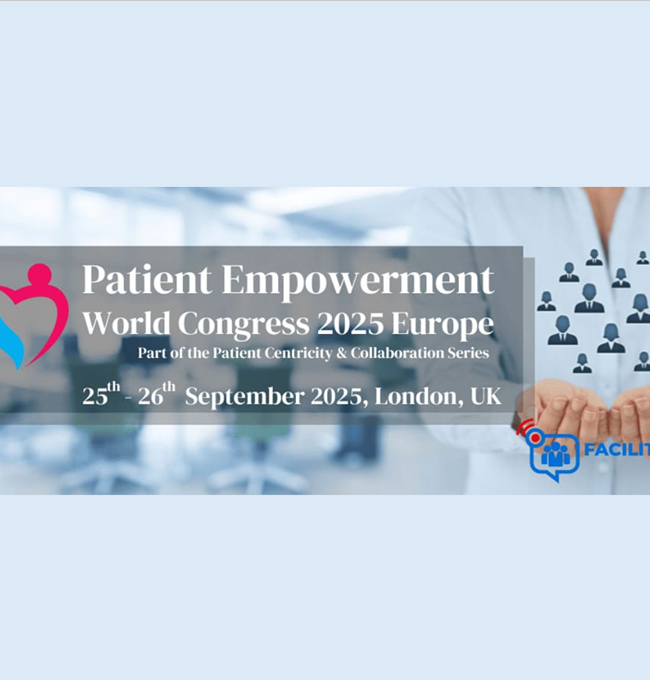Patient Empowerment World Congress Europe: A Human-Centred Approach to Healthcare, 25 - 26 September 2025, London UK

Laura-Lee Southall, MPharm MBA MCMI PGDip
Patient Strategy Director, Atlantis Health UK


Laura-Lee Southall, MPharm MBA MCMI PGDip
Patient Strategy Director, Atlantis Health UK
The Patient Empowerment World Congress brought together healthcare professionals, pharmaceutical companies, patient organisations, and advocates to discuss how to improve healthcare by involving patients more meaningfully. The event focussed on how we talk about patients, how we include them in decisions, and how we can make healthcare more personal and respectful. The pharmaceutical industry has come a long way, but the conference highlighted that further shifts are needed to unlock the next horizon in health outcomes.
Empowerment isn’t just about giving people information, it’s about creating a space where they feel safe, respected, and involved. HCPs need to understand what patients go through and how to support them. Behind every diagnosis is a person, and every conversation is a chance to make a difference. Humanising care means treating people with kindness, listening to their concerns, and helping them make informed choices.
From the presentations and panel discussions, 8 key themes emerged:
One of the first things discussed was the language we use in healthcare. Many speakers said that calling someone a “patient” can feel cold or distant. Instead, they suggested using phrases like “people living with a condition” to remind us that these are real people with lives, feelings, and goals.
The term “patient voice” was also challenged. Instead, the idea of “people empowerment” was encouraged, helping people feel confident and involved in their own care. Changing the way we speak can help change the way we treat people and how they experience care.
Empowerment means giving people the tools, knowledge, and support to take part in decisions about their health. But many people face barriers like not understanding medical terms, not having enough time, or feeling unsure about speaking up.
When people and their caregivers are supported properly, they can make better choices, follow their treatment plans, and feel more in control. Healthcare professionals should talk with people, not at them, and help them understand their rights and options.
To move towards treatments that consider the holistic experience of managing ill health, people should be involved in every step of developing new medicines, from early research to approval and beyond. Often, pharmaceutical companies decide what matters in a clinical trial, but patients may care more about how a drug affects their daily life, not just the medical results.
Some patients are already using technology like AI to track how their treatments work. Including people with the target conditions in trial design, choice of trial outcomes, and reviewing materials can lead to better, faster, and more useful research.
Behavioural science helps us understand why people make certain choices and how to influence future choices and behaviours. It can also be used to improve how patients join and stay in clinical trials - for example, some people feel overwhelmed after a diagnosis, while others worry about being given a placebo.
By using clear language, flexible scheduling, and real-life stories, researchers can help more people feel comfortable taking part. Behavioural science also helps tailor support to different needs and cultures and overcome individual barriers.
Good communication is key to empowering people. Medical language can be confusing, so it’s important to use words that are easy to understand. HCPs should take time to explain things, listen carefully, and show empathy.
Simple actions like using someone’s name, making eye contact, and asking what matters to them can build trust. Training HCPs to improve their communication skills can lead to better relationships and better health outcomes.
There are bigger problems in the healthcare system that need to be fixed. These include unequal access to care, unconscious bias, and confusing rules. For example, female HCPs often give more emotional support, while male patients may get more facts. This can lead to people feeling unseen or unheard.
We need to make care more personalised and fair for everyone. Technology like AI can help spot patterns and improve understanding, but it must be used carefully and ethically.
Patient organisations have grown from small support groups into powerful voices in healthcare. They now help shape research, influence policy, and improve services.
These organisations represent different types of patient experiences from individuals to experts with technical knowledge. Working with them early and often can help healthcare providers and companies understand what people really need and want.
To truly empower people, healthcare organisations need clear plans and goals. This means working with patients from the start, measuring progress, and making sure support is available throughout their journey.
Companies should ask patients what they need to know, share feedback, and avoid working in silos. Co-creating solutions with patients leads to better care and stronger partnerships.
The Patient Empowerment World Congress showed that healthcare needs to change. By treating people as partners, using clear and respectful language, and listening to their needs, we can build a system that works better for everyone.
Empowerment is not just a goal, it’s a journey we take together. When people feel heard, supported, and involved, healthcare becomes more effective, fair, and human.
We apply behavioural science to identify real barriers, build lasting motivation, and create patient experiences that work in the real world. We turn insight into action, co-creating programmes that are inclusive, compliant, and grounded in what matters most to patients.
Because when patients feel heard, supported, and empowered, outcomes improve. And that’s not just good for patients, it’s good for science, good for systems, and good for pharma.
If you’re ready to move from insight to implementation we’d love to talk.
👉 Let’s design behaviour change solutions that put patients at the centre, wherever you are in the product journey.
📩 Reach out to our team at www.atlantishealth.com or connect with me directly via LinkedIn.